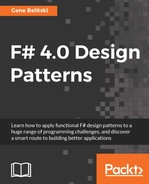The following are the key concepts and the list of skills you should take away after finishing this chapter and strive for absorbing and mastering:
Avoid mutable state and achieve data transformations over immutable values and data structures. Think of programming solutions in terms of verbs rather than nouns. Avoid expressing a solution in highly detailed imperative "how" statements; use the "what to do" approach instead. Generalize: prefer a general parameterized solution to a concrete one. Strive to minimize the moving parts of your solution instead of hiding these moving parts into classes. Try expressing solutions by a few well-known facilities instead of delving into producing custom ones. When appropriate, prefer lazy data collections (sequences) over eager ones.
This process of mastering the functional manner of thinking may be framed around the following three Rs - Retain, Recognize, and Reuse. The sooner you learn to recognize idiomatic functional design patterns which I'm going to cover with a great amount of detail in this book and the sooner you reuse these patterns again and again in your day-to-day coding activities, the better functional programmer you will become.
In the upcoming chapters, I will walk you over the many idiomatic uses of F# in certain development situations. These repeated usages will represent genuine functional programming design patterns. Please keep in mind that many of these patterns only to a certain extent correlate with traditional object-oriented design patterns (https://en.wikipedia.org/wiki/Design_Patterns), as well as other architecture design patterns of software engineering (http://www.amazon.com/Patterns-Enterprise-Application-Architecture-Martin/dp/0321127420).
In the next chapter, I'll give you a 360-degree high-level view of the F# language features and parts with their origins and evolvement.
